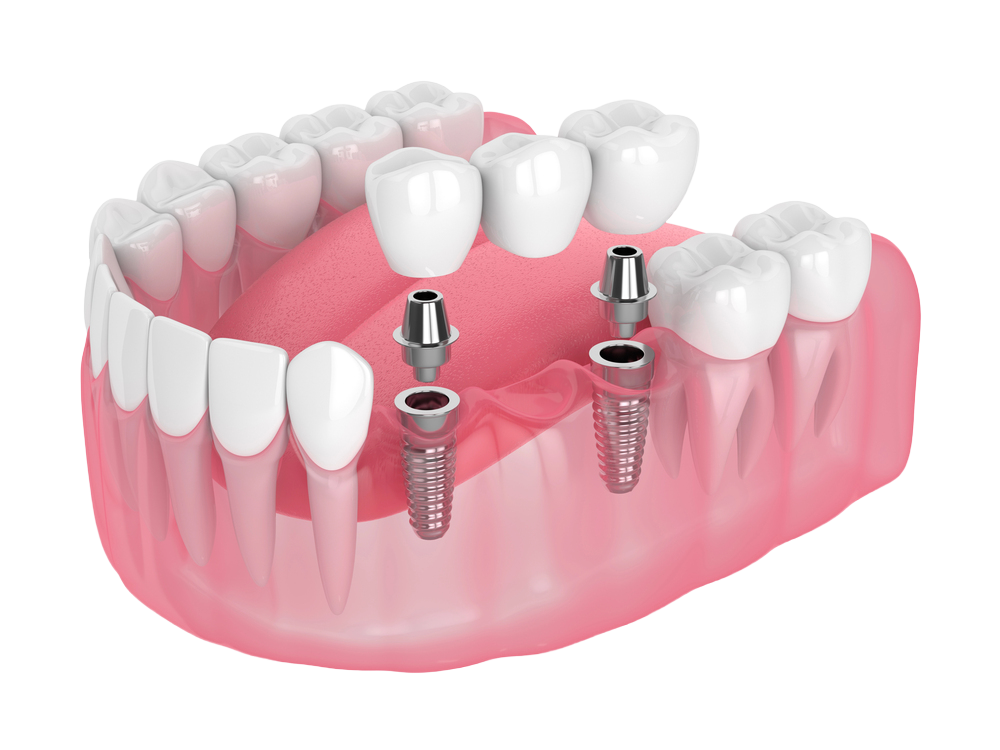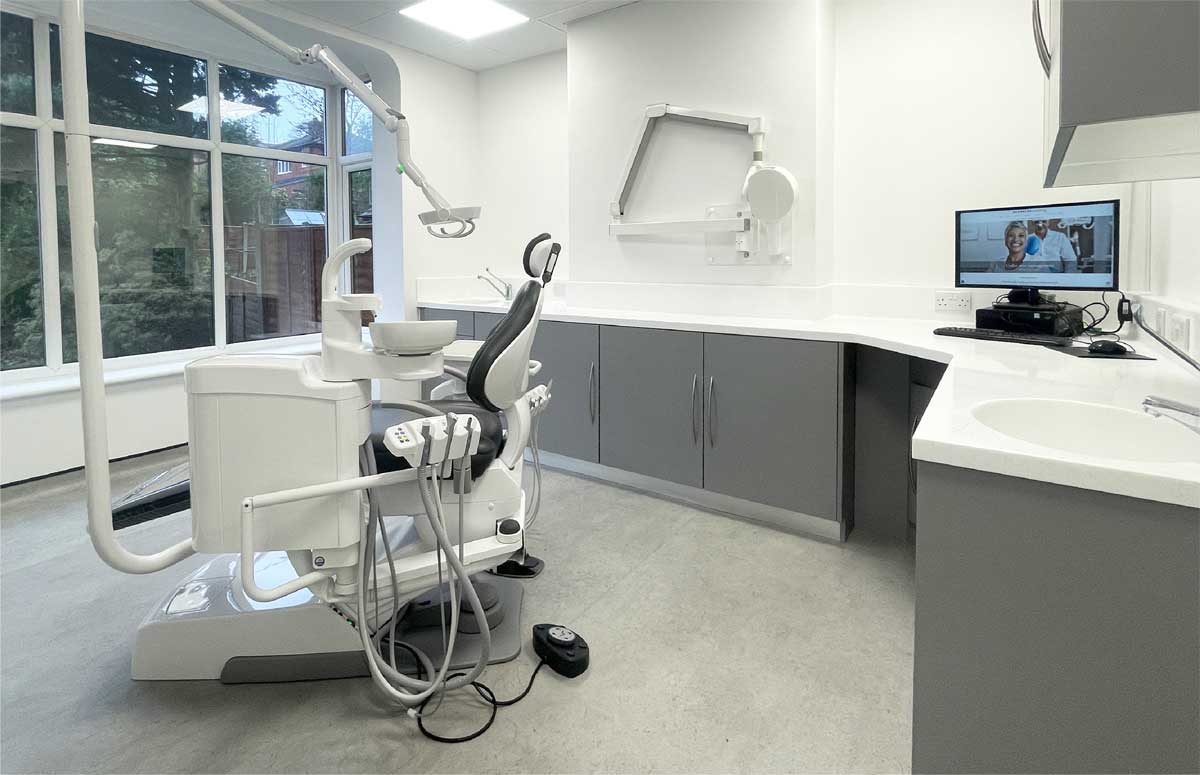Dental implants are advanced and permanent tooth replacement solutions that mimic the natural look, feel, and function of real teeth. They are small titanium posts surgically inserted into the jawbone, acting as artificial tooth roots to support dental crowns, bridges, or dentures.
Dental implants offer numerous advantages, including improved chewing ability, speech, and facial aesthetics. Moreover, they help prevent bone loss in the jaw, which often occurs when teeth are missing.
The integration of the implant with the surrounding bone provides stability and strength, making dental implants a highly reliable and long-lasting option for replacing missing teeth. As a result, patients can enjoy a beautiful and fully functional smile, along with the confidence and comfort that comes with having a permanent and secure dental restoration.

Treatment |
Price |
| Implant | from £2,200 |
Achieving the exceptional results that dental implants offer requires careful and precise planning. The first step in the process is to take a CT scan of your teeth and jaw. These detailed 3D images allow us to assess whether your jawbone has the necessary strength and stability to support the implant, and help us identify the ideal placement for optimal results.
Since a standard dental implant exerts significant pressure on the jaw, we may recommend a bone graft to strengthen the bone and increase its density, ensuring a secure foundation for the implant. However, depending on your individual case, there may be quicker alternatives that we can discuss with you.
When it comes time to place the implant, rest assured you’ll be under anaesthetic, so the procedure will be completely pain-free.



Jabir graduated from Leeds Dental Institute with a Masters in Dental Surgery. He has a keen interest in research and has had his work published in a European Journal. He then completed his foundation training as part of the Blackburn scheme, where he won the Restorative Case.
He has since worked in dental practices across the Lancashire/Greater Manchester regions. He has a strong interest in teeth straightening cases and uses a variety of excellent systems, like Invisalign, to achieve the best results for his patients.
Dr Duale is currently undertaking a Masters in Implantology and works for the emergency dental service to provide out of hours care.
One aspect of the job he enjoys in particular is replacing missing teeth because of the confidence it restores in the patient, and is willing to go to extreme lengths to ensure the result is as good as it can be for them.
In his spare time, Dr Duale has a strong interest in national politics (often boring everyone at work on the subject!). Whilst interested in some sports, his particular sporting interests are limited to football and boxing, although he is an avid Real Madrid fan (it’s a long story, he says). He also enjoys reading non-fiction and is most comfortable spending time with friends and family.
Dental implants offer a definitive solution to missing teeth. Unlike removable dentures, dental implants are surgically placed into your jawbone, where they fuse with the bone to create a stable, secure foundation for replacement teeth.
This stability makes dental implants a superior option for tooth replacement, providing a more natural feel and functionality compared to other alternatives.
In addition to enhancing your smile, dental implants can significantly improve your overall oral health. Missing teeth can cause gaps that make it harder to chew, speak, and maintain proper oral hygiene. Dental implants fill these gaps, restoring your ability to eat and speak comfortably, while also making it easier to keep your teeth clean.
Dental implants are a safe and reliable treatment. The surgery is a routine procedure with a high success rate, and complications are rare. However, as with any surgical procedure, there are potential risks. It’s important to discuss both the benefits and potential risks with your dentist to ensure dental implants are the right choice for you.
While dental implants can be a significant investment, the cost will depend on factors such as the number of implants needed, your dentist’s location, and the type of implant used. Despite the expense, many find that dental implants are a valuable investment in their long-term oral health and overall quality of life.
Dental implants are artificial tooth roots made from biocompatible titanium that are surgically inserted into the jawbone. They provide a secure and stable foundation for various types of replacement teeth, such as crowns, bridges, or dentures. This makes dental implants an ideal solution for those looking to replace one or more missing teeth with a long-lasting and natural-feeling option.
Dental implants offer a permanent solution for replacing missing teeth. A titanium post, known for its strength and durability, is surgically placed into the jawbone by a skilled dental surgeon. Over time, this post fuses with the bone in a process called osseointegration, providing a solid anchor for replacement teeth.
Each implant is placed precisely in a socket that has been carefully drilled at the exact location where the missing tooth was, ensuring that the false tooth is as secure and functional as a natural tooth root would be. The result is a stable, natural-looking smile that restores both function and appearance.
Ideal candidates for dental implants are individuals who have lost one or more teeth and have sufficient jawbone density to support the implant. Additionally, candidates should have healthy gums and be in good overall health. Non-smokers or those willing to quit are preferred, as smoking can impede the healing process and the success of the implant.
The dental implant process typically spans several months and includes multiple stages. The initial consultation is followed by the surgical placement of the implant. After surgery, a healing period of several weeks to a few months is necessary to allow the implant to fuse with the jawbone. Once healing is complete, the replacement tooth or teeth are attached.
During your consultation, your dentist will outline the full treatment timeline and provide a detailed explanation of each stage to ensure you are well-informed.
Dental implant surgery is performed under local anaesthesia, which numbs the area being treated, so most patients experience little to no discomfort during the procedure. Post-surgery, some mild soreness or discomfort is normal, but it is typically manageable with over-the-counter pain medication. Your dentist will provide guidance on how to manage any post-operative discomfort to ensure a smooth recovery.
With proper care and maintenance, dental implants are designed to last for many years. In fact, many implants can last for decades or even a lifetime. Regular dental check-ups and good oral hygiene practices are key to ensuring the longevity of your implants.
Caring for dental implants is similar to caring for natural teeth. This involves regular brushing and flossing, as well as routine dental check-ups and professional cleanings. By maintaining a consistent oral hygiene routine, you can keep your implants in excellent condition and avoid complications such as gum disease or bone loss around the implant.
While the success rate of dental implants is very high, implant failure can occur in rare cases. Causes of implant failure may include infection, insufficient bone integration, or implant rejection. Your dentist will take every precaution to reduce these risks by ensuring proper candidate selection and using advanced surgical techniques. Maintaining excellent oral hygiene and following post-surgical instructions will also help minimise the chance of failure.
If you have gum disease, it must be treated before you can receive dental implants. Untreated gum disease can jeopardize the success of the implant by causing further bone and tissue loss. Once the gum disease is under control, you may be eligible for dental implants. Your dentist will evaluate your oral health and advise you on the best course of action.
Dental implant coverage varies widely depending on your insurance plan. Some insurance policies may cover a portion of the implant procedure, such as the cost of the implant post or the final restoration (the replacement tooth or teeth), while others may not cover it at all. It is important to review your policy and speak with your insurance provider to understand what costs will be covered. Your dental practice may also offer financing options to make the procedure more affordable.
We are based on Blackburn Road, Bolton and our practice delivers both NHS and private treatment options to our patients.
Our patients are central to what we do and the treatment plan is tailored to the individual.
We offer a range of services from specialist treatments such as implants to cosmetic options such as teeth whitening, Invisalign and composite bonding.
© 2025 Sharples Dental - All rights reserved Privacy Policy Cookies Policy Contact us Website Design by Pivotal Marketing